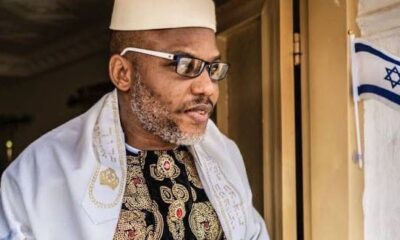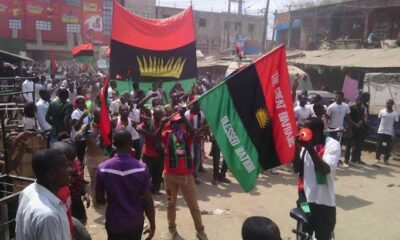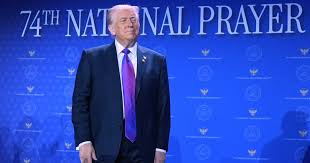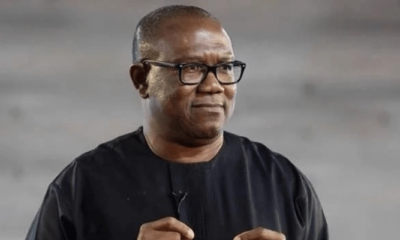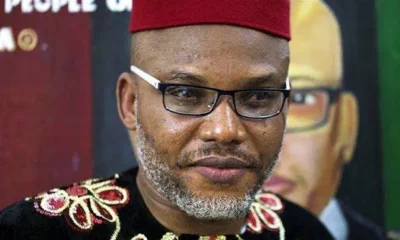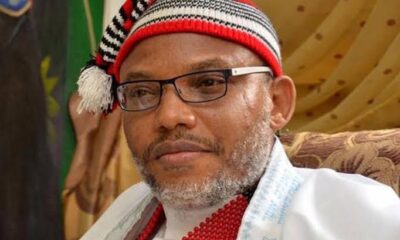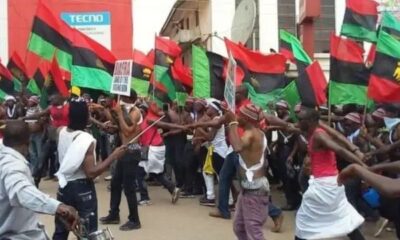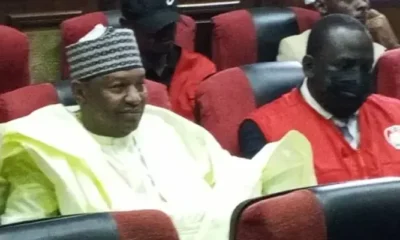News
Court Grants Nnamdi Kanu Fourth Chance to Defend Terrorism Charges
The Federal High Court in Abuja has, for the fourth time, given detained IPOB leader Nnamdi Kanu another opportunity to open his defence in the ongoing terrorism trial.
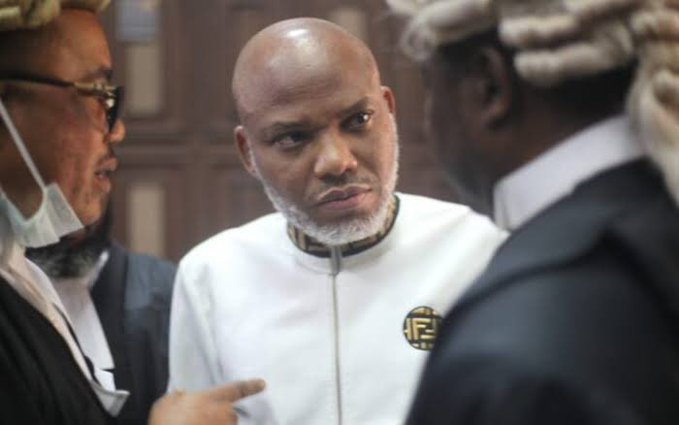
The Federal High Court in Abuja has, for the fourth time, given detained IPOB leader Nnamdi Kanu another opportunity to open his defence in the ongoing terrorism trial filed against him by the Federal Government of Nigeria.
Nnamdi Kanu Gets Another Adjournment in Terrorism Trial
The Federal High Court in Abuja has once again adjourned the trial of the detained leader of the Indigenous People of Biafra (IPOB), Nnamdi Kanu, granting him another opportunity to defend the terrorism charges brought against him by the Federal Government.
Justice James Omotosho gave the adjournment till November 7, 2025, after Kanu maintained that there were no valid charges against him and insisted he would not defend a case he described as “legally invalid.”
Kanu is currently facing a seven-count charge bordering on terrorism, a case that has drawn both national and international attention since his re-arrest and extradition to Nigeria in 2021.

Background of the Case
The Federal Government had, on June 19, 2025, closed its case after presenting five witnesses against Kanu. He was expected to open his defence thereafter, but his legal team filed a no-case submission, arguing that the prosecution had failed to establish a prima facie case.
However, on September 26, 2025, the court dismissed the no-case submission, ruling that Kanu had a case to answer and should proceed with his defence.
Despite this ruling, Kanu has repeatedly refused to open his defence — first in September, again in late October, and most recently during the November 4 sitting — each time citing legal and procedural concerns.
Kanu’s Argument: “No Valid Charges to Defend”
At the resumed hearing on Wednesday, Kanu once more declined to begin his defence, arguing that the charges were invalid because they were filed under a repealed law.
He contended that the Terrorism Prevention and Prohibition Act under which he was being tried had been repealed, and that the Supreme Court, in its earlier judgment ordering his retrial, had directed the Federal Government to amend the charge accordingly.
“The Terrorism Prevention and Prohibition Act has been repealed. I cannot put up a defence under a repealed law. I won’t do that,”
— Nnamdi Kanu, in court.
Kanu argued that the government’s failure to amend the charge was a violation of the apex court’s directive and rendered the trial legally defective.
Judge Urges Caution, Grants Another Adjournment
Justice Omotosho, after listening to Kanu’s lengthy submission, advised him to “keep his gunpowder dry” — a caution to remain calm and prepare properly for his defence.
However, Kanu maintained that he would not proceed until the issue of the “invalid charge” was resolved.
The IPOB leader later stated that he was willing to open his defence but would first need to consult his four legal consultants — Nnaemeka Ejiofor, Aloy Ejimakor, Maxwell Okpara, and Mandela Umegborogu.

The judge then encouraged him to consult lawyers familiar with criminal law to properly structure his defence.
DON’T MISS: BREAKING: U.S. Department of Defense Begins Mapping for Military Operation in Nigeria
Prosecution Seeks Enforcement of Earlier Order
Earlier in the proceeding, counsel to the Federal Government, Adegboyega Awomolo (SAN), urged the court to enforce its previous directive compelling Kanu to either open his defence or waive his right to do so.
Awomolo argued that repeated adjournments had unnecessarily delayed the trial and that the defendant’s consistent refusal to proceed amounted to deliberate obstruction of justice.
Judge Rules in the Interest of Justice
Despite the prosecution’s request, Justice Omotosho said he was willing to “bend backwards” once more to give Kanu another chance, emphasizing that the court’s duty was to ensure fairness to both sides.
“The adjournment is granted in the interest of justice, both to the defendant and to the nation,”
— Justice James Omotosho.
The matter was subsequently adjourned to November 7, 2025, for the IPOB leader to finally decide whether to open his defence or forfeit the opportunity.
Context: The Ongoing Trial
Nnamdi Kanu, a British-Nigerian political activist and founder of the Indigenous People of Biafra (IPOB), has long advocated for the secession of the South-East region of Nigeria.
He was first arrested in 2015 and charged with treasonable felony, before being released on bail in 2017. After leaving the country, he was re-arrested in Kenya and extradited to Nigeria in June 2021 under controversial circumstances.
Since then, Kanu’s trial has been marked by numerous adjournments, appeals, and legal disputes over jurisdiction, detention conditions, and the validity of the charges.
What Comes Next
As the court prepares to reconvene on November 7, legal observers say Kanu’s decision at the next sitting could determine the pace of one of Nigeria’s most politically sensitive trials.
If he continues to decline to open his defence, the court may proceed to waive his right to defence and deliver judgment based on the prosecution’s evidence.




